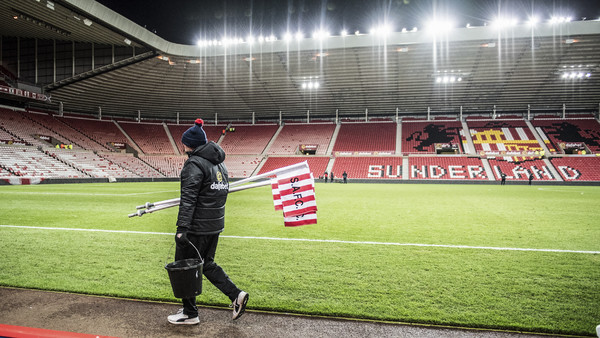Review: Sunderland ‘Til I Die Is A Powerful & Poignant Netflix Documentary
Netflix's eight-part Sunderland AFC docu-series hits real highs by charting the lows.

Streaming documentaries about professional football clubs are a relatively new phenomenon, but thus far they’ve focused on giants of the game. Earlier this year, Netflix aired First Team: Juventus, focusing on the titular club - one of the world’s biggest. Then came Boca Juniors Confidential, offering a look one of the most successful teams from outside of Europe. Meanwhile, Amazon unveiled their own behind-the-scenes football docu-series, centred around the billionaire-backed, globally-branded champions of England, Manchester City.
Now Netflix are back in the beautiful game, with a new documentary that looks at... Sunderland?
The question of ‘why’ is an obvious one. Sunderland currently ply their trade in League One, the third tier of English football, after back-to-back relegations. It’s a far cry from the glitz and glamour of Juventus; more Renford Rejects than All or Nothing. But then, that’s precisely the point.
Sunderland ‘Til I Die isn’t an exercise in advertising the brand. It’s not a sanitised marketing tool, but instead a searing account of the connection between a football club and the city it belongs to, and what happens to the latter when the former begins to struggle.
Full disclosure, I’m a Sunderland fan (‘til I die, for my sins), but this should appeal to any and all fans of a team that exists outside the bubble of the biggest clubs.
The eight-episode first season (a second is already in the works) charts the very few highs and many, many lows of the 2017-18 Championship season, after Sunderland suffered relegation from the Premier League. We witness players coming and going, and likewise managers, the chief exec, owner, and plenty of other staff who are victims of the way the club was run.
Sunderland ‘Til I Die achieves a great balance between what’s happening on the pitch and off it. We see a promising start to the season that turns into a desperate free fall. We find new players struggling to get into the team, or with a crisis of confidence. Some come off better than expected: Jason Steele, a hapless goalkeeper, lives up to his surname with a steely, winning determination. Welsh midfielder Jonny Williams will leave you wanting to give him a cuddle. Others don’t fare so well: a brief appearance from Jack Rodwell, a midfielder happy to sit on 70k-a-week without playing at a debt-ridden club, is guaranteed to generate a lot of anger. Martin Bain, the chief executive charged with doing the dirty work of owner Ellis Short, is a mixed bag; you get the sense of the task facing - and weighing on - him, but he also never comes off as likeable. Short himself is conspicuous by his absence, only briefly appearing in the final episode to offer a “no comment”, which ultimately says it all.

But for as much as the series is about the trials and tribulations of those mentioned and all others at the club, it’s about the fans and the city even more. Sack the manager, sell some players, change the owner, and what’s left?
Sunderland ‘Til I Die works so well because it knows the answer, and recognises the importance of those fans. It gets to the heart of how much this club means to them, and it’s about so much more than just three points. This is everything. We hear various accounts from a number of fans, who serve as narrators to keep the story on track, and see how the club’s performance affects the city as a whole. A city that has been hit harder than many, and for whom the club is either its shining jewel or its greatest shame. But either way, it’s theirs.
The documentary, made by production company Fulwell 73 (who hail from Sunderland themselves), is a rarity amongst sporting documentaries, in that it truly understands what it means to be a fan. As such, it conjures up a myriad of feelings that any football fan will be well accustomed to: sadness, pain, anger, despair, and for moments all too fleeting, joy and hope. But it’s the latter two that make it all worthwhile; they’re the reason you keep going back. The reason you dare to dream, keep the faith, and know that things can only get better.
The opening theme song, Shipyards by Sunderland artist The Lake Poets, harks back to the city’s industrial past. In it, he sings: “But if you could see me now, I hope that I am making you proud.”
It’s a personal, poignant song about his grandfather, but a fitting one for this series. But by the end, as a new dawn breaks over the Stadium of Light, it’s a message that comes from the club to its fans and its city. And as the credits roll with the promise of a brighter tomorrow, the prevailing sense is that the club is once-again doing the city proud.
Why Sunderland? That’s why.
What did you think of Sunderland 'Til I Die? Let us know down in the comments.